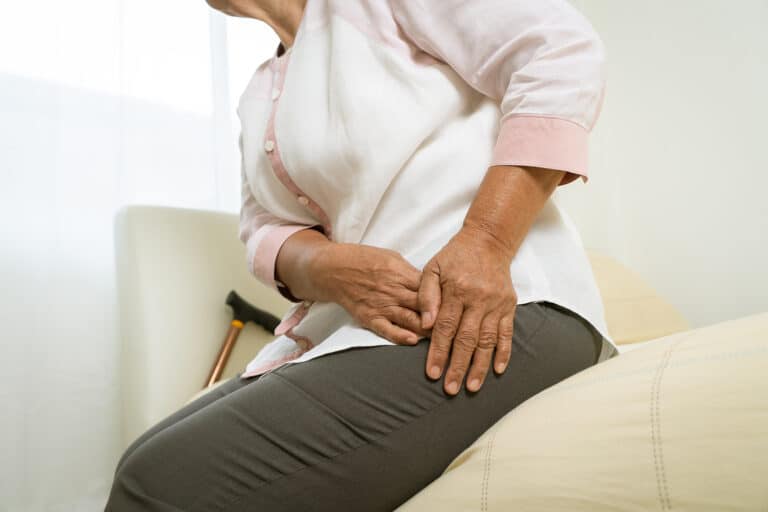Detecting when a senior’s hip issues require professional intervention is crucial for maintaining their overall well-being and quality of life. While some discomfort or stiffness may be a normal part of aging, certain signs and symptoms should prompt attention from healthcare professionals. Here are key indicators that suggest seniors may need professional intervention for hip issues and how the senior home care team can help.
- Persistent Pain: Proper monitoring can target persistent pain and provide essential information to medical professionals. For instance, continuous and intense pain in the hip joint or surrounding areas, especially if it hinders daily activities or disrupts sleep, may indicate a need for professional assessment. Also, pain that persists during rest or worsens at night can be indicative of more serious hip conditions and warrants medical evaluation.
- Limited Range of Motion: If seniors experience difficulty performing routine activities like walking, bending, or getting in and out of chairs due to restricted hip movement, it’s a sign that professional help may be necessary.
- Swelling and Inflammation: Swelling around the hip joint that is also red or warm could be a sign of inflammation or an underlying problem that needs medical attention. With senior home care on their side, seniors can also gain assistance in dealing with swelling issues to hopefully minimize some of the pain.
- Instability and Weakness: Seniors who feel unsteady on their feet or experience weakness in the hip muscles may be at risk of falling, necessitating professional assessment and intervention. Since balance issues and falls are something to be mindful of, this is another area where having senior home care available is a good idea.
- Changes in Gait: An altered or uneven walking pattern may suggest hip problems. If a senior develops a limp or starts favoring one side, it’s essential to consult a healthcare professional.
- Audible Clicking or Popping: Clicking, popping, or grinding sounds in the hip joint could be a sign of underlying issues such as arthritis or labral tears, necessitating professional examination.
- History of Trauma: Seniors with a history of hip injuries, fractures, or surgeries may require ongoing monitoring and professional care to manage any potential long-term effects.
- Impact on Daily Activities: If hip issues significantly impact a senior’s ability to perform daily tasks and activities, it’s crucial to seek professional advice to improve functionality and quality of life. While senior home care can assist with these daily activities, seniors will feel better if they can also contribute.
- Systemic Symptoms: Systemic symptoms such as fever or chills, especially when accompanied by hip pain, may indicate an infection and require immediate medical attention.
It’s important to note that each individual is unique, and the presence of one or more of these signs doesn’t necessarily indicate a specific condition. A comprehensive evaluation by a healthcare professional, such as a primary care physician, orthopedic specialist, or physical therapist, is essential for accurate diagnosis and appropriate intervention tailored to the senior’s needs. Early detection and intervention can significantly improve outcomes and enhance a senior’s overall health and mobility. With the assistance and support of loved ones, senior home care, and health care, seniors can thrive even with hip issues.
If you or an aging loved one are considering Senior Home Care in Leesburg, VA, please contact the caring staff at Access Home Care Inc. today! Call at (703) 765-9350
Access Home Care provider in Arlington, Alexandria, Leesburg, Reston, Herndon, Manassas, Ashburn, Falls Church, McLean, Lorton, Springfield, Woodbridge, Fairfax, Virginia and the surrounding communities.
“My desire to enter into nursing started when one of my older sisters died of kidney disease due to lack of care. At age 15, I decided to enter into nursing so that I could provide quality care to patients.Upon arrival in United States at 21 years of age, I enrolled in T.C Willliams School of Practical Nursing while working as a nursing assistant at a nursing home. I also worked as a part-time home health aide to take of the elderly. After completion of my practical nurse education, I worked in geriatric psychiatry unit at Dominion Hospital and Arlington Correctional facility mental health unit.
I completed Marymount University in 2001 and entered into Home Care as a field case manager.
I held that position for 2 years and as an Administrator, and for another 2 years until Access Home Care was found in 2004."
Today, Access Home Care has over 300 employees and 286 clients.
- Five Tips for Living with Chronic Lower Back Pain - April 3, 2025
- How 24-Hour Home Care Is Different From Other Types Of Care - March 19, 2025
- Four Symptoms of Advanced Multiple Sclerosis - March 5, 2025



